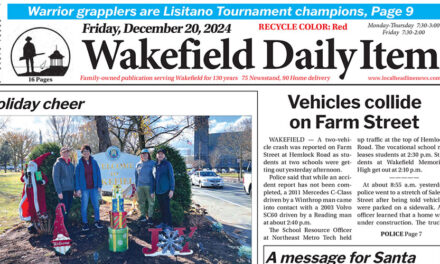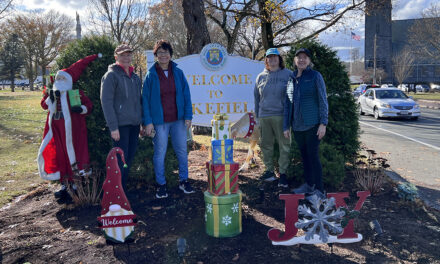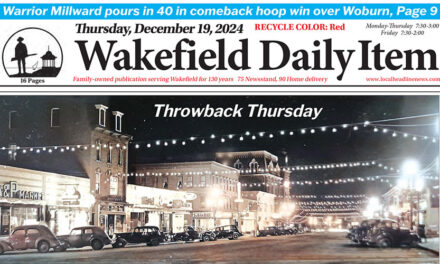Published in the March 22, 2016 edition.
By MARK SARDELLA
WAKEFIELD – The town’s efforts to revitalize the downtown business district got yet another boost last week.
The Metropolitan Area Planning Council (MAPC) approved a $40,000 grant to help the town develop an economic and cultural development strategy for the downtown area, specifically with an eye toward turning Albion Street into a cultural district.
The town has already formed a committee, “The Albion Cultural Exchange,” to begin looking at the former Municipal Gas & Light Department office building at 9-11 Albion St. as a future cultural arts center.
“We hope to turn the old Light Department headquarters building into an arts incubator,” Town Planner Paul Reavis said last week. “This technical assistance grant will examine the potential uses of the Light Department building and how we can leverage the building to attract arts-related businesses to the area and revitalize Albion and Main streets. We will be planning several public forums to explore the best ideas and promote this effort.”
Now vacant, the building is viewed by Reavis, Town Administrator Stephen P. Maio and others as a unique opportunity. They envision re-purposing the building as a home for arts-related businesses and galleries. The upper-floor spaces are seen as potential studios.
In submitting the grant request in early February, Reavis told the MAPC that the town’s idea of repurposing the old Light Department building as an “incubator for cultural activities” has gained broad support in the community and is viewed as a possible first step in a strategy to transform Albion Street (over time) into a cultural district.
While a feasibility study and cost estimates for the needed building upgrades are not part of the grant’s scope, officials hope MAPC can assist the town to consider the building in the context of programming Albion Street and this sector of the downtown.
Reavis said he anticipates that the MAPC grant will result in “a workable strategic plan with action steps that could be implemented in both the short and long term to develop this area of Town into a thriving cultural district.”
Reavis hopes that MAPC will also recommend strategies for promoting artists’ live/work-space housing in the area, then drafting a 40R bylaw tailored to Albion Street’s small-lot constraints. Chapter 40R of the Massachusetts General Laws encourages cities and towns to establish new overlay zoning districts to promote housing production and smart growth development in areas near public transit and town centers, especially in areas suitable for mixed-use development.
Reavis also hopes that MAPC might be able to help overcome a history of reluctance on the part of some landlords to consider alternatives to the status quo.
Albion Street property owners have largely left the street’s image in the hands of their tenants, Reavis said, who often have enough trouble paying rents and making those improvements required by code. He hopes that the final recommendation of the MAPC-funded report will include case studies from other towns where storefronts have been made more inviting as well as a strategy to fund such improvements.
The grant application submitted by the town stresses the importance of public participation in the process of formulating an economic development strategy to change a sector of the downtown.
According to Reavis, the town will be holding a series of public meetings in an inclusive public participation process in order to gather community input. The town is looking to MAPC’s experts for help in reaching out and engaging a broad range of civic groups, arts organizations (music, writing and theater, as well as art), local stakeholders, business and property owners and all age groups – seniors, teens and children.
“Inviting the creative and talented people of Wakefield to participate in a transparent public process would greatly benefit the town,” the application states. “MAPC could help the town organize a meeting format that could be repeated on an annual basis. By establishing an annual meeting, the stakeholders and residents would have a forum to voice concerns and inform land use and planning decisions as the cultural district grows.”
The application prepared by Reavis also stresses the need to identify a cultural development strategy that can be embraced by all of the diverse groups with a stake in downtown revitalization, including the Chamber of Commerce, the Events Planning Committee, the Wakefield Main Street Program and the Albion Cultural Exchange.
“Wakefield seeks MAPC’s assistance to engage all the Town’s civic groups, arts organizations and property owners in a robust public process to discover a sustainable vision for the Albion Street sector of Wakefield’s downtown.”
Now that the grant has been approved, the MAPC staff will work with Reavis to prepare a more detailed scope of services and a budget, which will then be signed by MAPC and the Town. The work would then proceed in the immediate future.
“We expect that this project will take around six months in order to facilitate a successful public process, complete appropriate research and produce the final report,” Reavis said.




